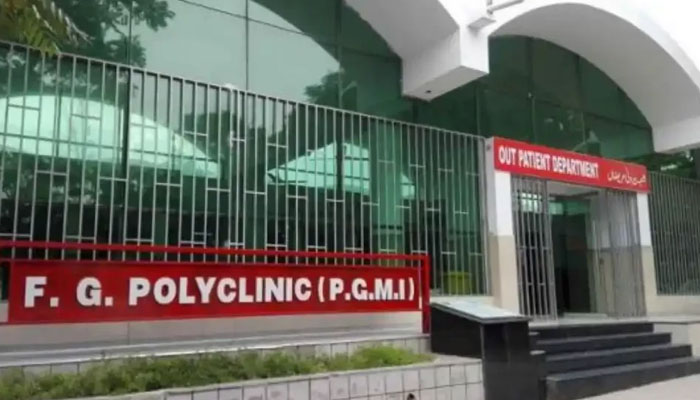US-funded cell at Polyclinic offers lifeline to rape survivors
Islamabad : The Anti-Rape Crisis Cell at the Federal Government Polyclinic in Islamabad offers an integrated service where survivors of sexual assault can receive medical treatment, psychological support, and legal assistance, all under one roof, ensuring a holistic approach to their recovery, said head of the Department of Gynaecology at the hospital Dr Naushin Farooq.
“Victims of sexual violence or rape can seek treatment for their physical injuries, as well as psychological counseling at our all-hours cell, in a confidential and safe environment,” Dr Farooq told ‘The News’.
She said that all services were provided by the facility at no cost, with a strict policy of confidentiality to protect the privacy and dignity of the visitors.
The gynaecology department's head emphasised that sexual violence and rape were not only public health concerns but also human rights violations, so healthcare providers should uphold the rights of survivors.
She said that the Anti-Rape (Investigation and Trial) Act, 2021, guaranteed the prompt delivery of high-quality healthcare services designed to address the needs of sexual violence survivors.
Dr Farooq said that the establishment of the dedicated centre to address the urgent needs of rape survivors was made possible with support from UN Women and funding from the US Embassy's Office of International Narcotics and Law Enforcement.
She said that the cell’s goal was not only to treat the victims of sexual violence but also to assist them in pursuing legal action if they chose.
"We provide a complete range of services, from medical care to legal guidance, ensuring that every person who walks through our doors receives the help they need," she said.
Dr Farooq also said that as part of its mission, the Anti-Rape Crisis Cell also aimed to educate people about the resources available to rape victims, emphasising the significance of breaking the stigma surrounding such cases.
"We need to raise awareness and ensure that people know about this centre and the support it offers."
The gynaecology department's head said that it was vital to bring the service to the attention of those who needed it the most and assure them that their confidentiality and dignity will always be preserved.
She said that the initiative had been designed to be a one-stop solution for survivors of sexual violence, offering them a secure space to heal, both physically and emotionally.
"Anyone who comes to us is treated like a patient, with respect and empathy," she insisted.
"Our mission is to ensure that survivors donot face further trauma due to stigma or lack of support. We want them to feel empowered to move forward."
Dr Farooq said that the cell's efforts went beyond treatment and legal aid—it was also a crucial step in challenging the societal stigma that often surrounds rape survivors.
"Through this programme, we seek to provide much-needed relief and dignity to individuals who have suffered at the hands of sexual violence."
She urged the media, civil society, and the public to play an active role in spreading awareness about the Anti-Rape Crisis Cell and its services, saying together, we can help remove the stigma and provide rape survivors with the support they deserve.
-
 Jaden Smith Walks Out Of Interview After Kanye West Question At Film Premiere
Jaden Smith Walks Out Of Interview After Kanye West Question At Film Premiere -
 Why Halle Berry Wasn't Ready For Marriage After Van Hunt Popped Question? Source
Why Halle Berry Wasn't Ready For Marriage After Van Hunt Popped Question? Source -
 Michelle Obama Gets Candid About Spontaneous Decision At Piercings Tattoo
Michelle Obama Gets Candid About Spontaneous Decision At Piercings Tattoo -
 Bunnie Xo Shares Raw Confession After Year-long IVF Struggle
Bunnie Xo Shares Raw Confession After Year-long IVF Struggle -
 Brooks Nader Reveals Why She Quit Fillers After Years
Brooks Nader Reveals Why She Quit Fillers After Years -
 Travis Kelce Plays Key Role In Taylor Swift's 'Opalite' Remix
Travis Kelce Plays Key Role In Taylor Swift's 'Opalite' Remix -
 How Jennifer Aniston's 57th Birthday Went With Boyfriend Jim Curtis
How Jennifer Aniston's 57th Birthday Went With Boyfriend Jim Curtis -
 JoJo Siwa Shares Inspiring Words With Young Changemakers
JoJo Siwa Shares Inspiring Words With Young Changemakers -
 James Van Der Beek Loved Ones Breaks Silence After Fundraiser Hits $2.2M
James Van Der Beek Loved Ones Breaks Silence After Fundraiser Hits $2.2M -
 Disney’s $336m 'Snow White' Remake Ends With $170m Box Office Loss: Report
Disney’s $336m 'Snow White' Remake Ends With $170m Box Office Loss: Report -
 Travis Kelce's Mom Donna Kelce Breaks Silence On His Retirement Plans
Travis Kelce's Mom Donna Kelce Breaks Silence On His Retirement Plans -
 Premiere Date Of 'Spider-Noir' Featuring Nicolas Cage Announced
Premiere Date Of 'Spider-Noir' Featuring Nicolas Cage Announced -
 Pedro Pascal's Sister Reveals His Reaction To Her 'The Beauty' Role
Pedro Pascal's Sister Reveals His Reaction To Her 'The Beauty' Role -
 Kate Middleton Proves She's True 'children's Princess' With THIS Move
Kate Middleton Proves She's True 'children's Princess' With THIS Move -
 Paul Anka Reveals How He Raised Son Ethan Differently From His Daughters
Paul Anka Reveals How He Raised Son Ethan Differently From His Daughters -
 'A Very Special Visitor' Meets Queen Camilla At Clarence House
'A Very Special Visitor' Meets Queen Camilla At Clarence House




